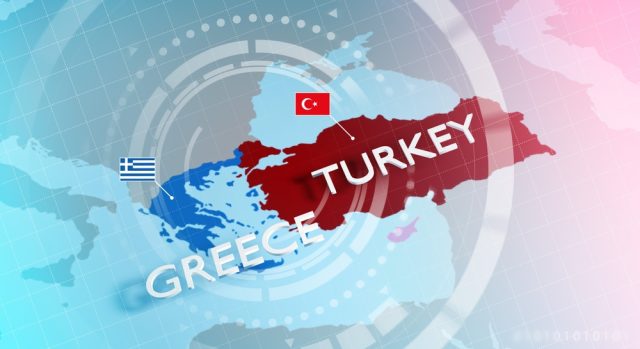
Tensions between Greece and Turkey have risen again in recent weeks, a fact that worries both NATO and the European Union, at a time that is already complex in international relations due to the war in Ukraine, but also the Chinese claims on Taiwan.
The issues related to Greek territorial sovereignty are a long-standing issue that has never been fully resolved. The history of Greece and Turkey is certainly not one of good neighbourliness, but of coexistence that is badly endured by both sides. The bone of contention between the two states concerns the complex definition of maritime borders and the status of the island of Cyprus.
In the Treaty of Lausanne of 1923, which ended the Greek-Turkish conflict and redrew the borders between the two countries, the eastern Mediterranean islands claimed by Turkey, namely Samothrace, Limnos, Lesvos, Chios, Ikaria and Samos were assigned to Athens. The treaty has been regularly contested by Ankara ever since the presence of gas in the waters around these islands came to light.
Tensions, however, have never subsided and, in recent months, relations between Ankara and Athens have further deteriorated.
Greece, in fact, has deployed troops on islands that, according to Turkey, should be demilitarised, immediately provoking the reaction of President Erdogan, who threatened the Greek troops by declaring that ‘we could suddenly arrive one night’. For its part, the Greek government justified itself by claiming that it acted in response to a massive increase of Turkish troops along the border coast.
German Chancellor Olaf Scholz intervened in the affair, declaring that two NATO member states should respect each other’s territorial sovereignty. The Chancellor then called on the two disputants to settle the dispute through the legal and peaceful means offered by international law. Scholz, who hypothesised a mediator role for Germany, focused on the potential of the Mediterranean, which should be exploited for the benefit of the populations of both countries.
Greek President Mitsotakis stated that the troops stationed on the eastern Mediterranean islands are not a threat to Turkey. However, he made it clear that to better protect the country, 40 German infantry fighting vehicles would soon be deployed along the Turkish border in northern Greece. “One cannot change history with imperial illusions or geography with falsified maps,” said the Greek leader.
Erdogan’s direct threats risk scuppering the de-escalation efforts demanded by the European Council at its meetings in March and June 2021. Greece’s rights over the eastern Mediterranean islands, enshrined in international treaties, are unassailable and Turkey should respect them, seeking possible peaceful solutions to the disputes.
For Ankara, the issue of the sovereignty of the eastern Mediterranean islands is now linked to the energy crisis. The Turkish government is afraid of being excluded from the Eastmed gas pipeline.
Greece, in fact, has become the new energy hub of the Mediterranean, as the Tap pipeline and the Igb interconnector pass within Greek borders.
In anticipation of this, Turkish Foreign Minister Cavusoglu will be in Libya in the coming weeks to sign a new bilateral agreement that will open up the possibility of exploiting Libyan oil and natural gas to Turkish companies. Greece does not hide its concern as the risk is that this will lead to a violation of maritime borders in the vicinity of the island of Crete. For the Turkish Foreign Minister, however, it is the Greek ships that have repeatedly tried to violate the waters under the Turkish-Libyan agreements, making clear mention of the incident in which the Greek Coast Guard fired at a ship that refused to be inspected.
The peace and stability of the West also depends on relations with Turkey. There is, therefore, a new (or perhaps old…) front to keep under control, in which NATO’s role remains crucial. In fact, US National Security Advisor Jake Sullivan, who met in Ankara a few days ago with the Chief Advisor to the Turkish Presidency, Ibrahim Kalin, on matters related to the war in Ukraine, nevertheless wanted to make a reference to the tensions with Greece and emphasise “the importance of dialogue and diplomacy in resolving any disputes in the eastern Mediterranean”.



 Subscribe
Subscribe